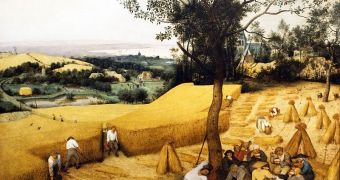Vulnerable creatures strongly depend on farming practices applied in developing countries. Even if human intervention has been seen as a threat factor for the balance of animal species, a new study issued by the University of East Anglia (UEA) gives a whole new perspective on this theory.
Experts from UEA agree upon the fact that species like the White-shouldered Ibis in Cambodia, the Sociable Lapwing in Kazakhstan and the Liben Lark in Ethiopia are influenced by the presence of people and their farming techniques.
They would suffer a great deal or even vanish into thin air if agriculture with a low ecological footprint were abandoned.
Most of the previous researchers who studied this connection stated that agriculture, correlated with deforestation and habitat loss is responsible for the decline of several species.
At this point, UEA scientists are certain that sustainable farming practices can provide benefits for creatures with a fragile balance. Two of the most important techniques taken into consideration by experts are land grazing and growing cereal crops.
So far, scientists managed to identify 30 rare species depending on human intervention in developing countries. Biodiversity preservation through traditional agricultural methods is a practice quite common for European nations, but scarcely applied in other countries.
"Many of the traditional farming systems that benefit these species are now under threat both from industrial, large-scale agriculture and from more local economic development. We need to identify valuable farmland landscapes and support local people so that they can continue their traditional farming methods and help maintain this unique biodiversity,” reveal the authors of the study.
Industrial agriculture is another story. Experts note that such practices often imply that in most of the cases local people are stimulated or forced to abandon their lands, actions with no benefits for the environment.
In order to conserve biodiversity and encourage progress at the same time, farmers should receive “economic or development benefits” aiming to back their traditional activities that provide advantages for wildlife representatives.
Harnessing this connection could represent a win-win situation both for local economies and the fate of endangered creatures.
"We have seen some of the poorest villagers denied access to their traditional grassland grazing and fishing lands, once these have been allocated to large businesses for intensive rice production," reveals Dr Paul Dolman, the co-author of this recent study.
"Although this helps produce food for export and helps the national economy, local people can suffer along with threatened birds which once nested in these grasslands. By identifying this link between people and threatened wildlife, we hope to help both,” concludes Dolman.

 14 DAY TRIAL //
14 DAY TRIAL //